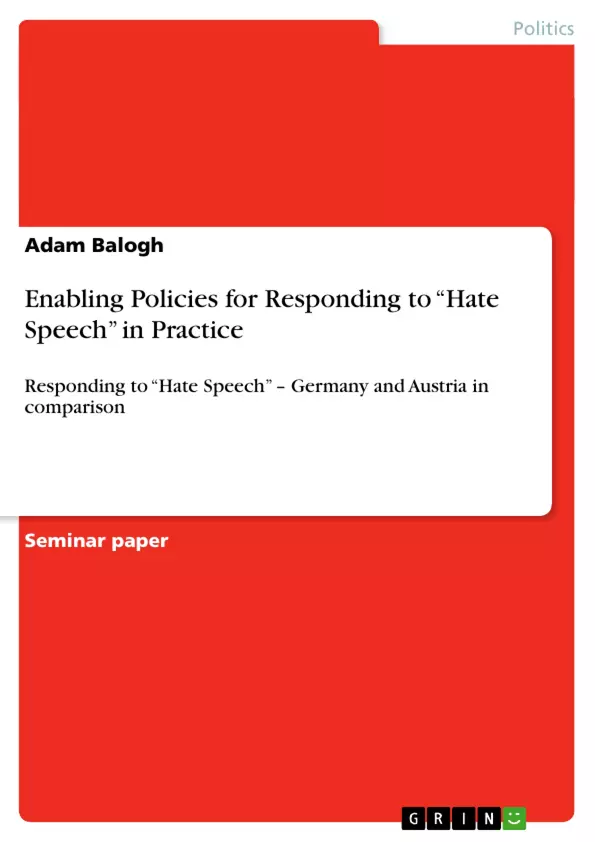In 2004, the German physical education instructor Stefan Herre founded the Islamophobic and extreme right website "Politically Incorrect". What started as a small blog of an individual is today the largest German-speaking website for the extreme right and Islam enemies (Spiegel Online 2011). It is ranked among the thousand biggest German websites in terms of traffic and more than 60,000 people visit daily "Politically Incorrect". A large part of them come from Austria and Switzerland (Frankfurter Rundschau 2011).
Unfortunately, this example shows that even today, more than 60 years after fascism, Muslims often face hostility in both Germany and Austria. The so called “Hate Speech”, and the institutionalization of “Hate Speech” by websites like "Politically Incorrect", account for a large part of this hostility. Therefore, the state, which has the responsibility of protecting its citizens, has also the duty to develop effective ways of responding to “Hate Speech”. This term paper deals with the question whether Germany or Austria have these effective policies for responding to “Hate Speech”. And if yes, which one of these two countries has better legal or extralegal ways for a response.
Inhaltsverzeichnis (Table of Contents)
- Introduction
- Legal responses to “Hate Speech”
- Country comparison between Germany and Austria
- Germany
- Austria
- Summary of the Real Life Response to „Hate Speech“
- Policy Recommendations
Zielsetzung und Themenschwerpunkte (Objectives and Key Themes)
This paper explores the effectiveness of policies in Germany and Austria for responding to "Hate Speech," particularly focusing on the legal framework and real-world application. The analysis aims to determine which country exhibits stronger measures and strategies against "Hate Speech." Key themes examined in the paper include:- Defining and understanding the nature of "Hate Speech"
- Balancing freedom of expression with the protection of minority groups from discrimination and hate
- Comparing the legal frameworks of Germany and Austria regarding "Hate Speech"
- Analyzing the effectiveness of legal and extralegal responses to "Hate Speech" in both countries
- Providing policy recommendations based on the findings of the comparison
Zusammenfassung der Kapitel (Chapter Summaries)
Introduction
The introduction sets the stage by highlighting the prevalence of "Hate Speech" online, particularly exemplified by the website "Politically Incorrect." The paper emphasizes the importance of addressing "Hate Speech" as a societal issue and explores the legal and extralegal responses in Germany and Austria.Legal responses to “Hate Speech”
This chapter defines "Hate Speech" and examines the ongoing debate about its regulation in democratic societies. It discusses the conflict between freedom of expression and protecting individual dignity and equality. The chapter also draws a comparison between the U.S. and European legal traditions regarding "Hate Speech."Country comparison between Germany and Austria
This chapter delves into the legal frameworks of Germany and Austria concerning "Hate Speech." It analyzes their respective constitutions and legal systems, highlighting the presence or absence of specific "hate speech" laws.Summary of the Real Life Response to „Hate Speech“
This chapter summarizes the findings of a real-life case study conducted by the author and other students, investigating how authorities in Germany and Austria respond to "Hate Speech" in practice.Policy Recommendations
This chapter presents policy recommendations based on the comparative analysis of legal and extralegal responses to "Hate Speech" in Germany and Austria.Schlüsselwörter (Keywords)
The paper centers around the crucial concepts of "Hate Speech," freedom of expression, legal frameworks, and the comparative analysis of Germany and Austria. It examines the complexities of balancing individual liberties with protecting vulnerable groups from discrimination. This study also explores the efficacy of legal and extralegal measures against "Hate Speech" in both countries, providing insightful recommendations for policy development.Frequently Asked Questions
What is "Hate Speech" in the context of this study?
Hate Speech refers to public communication that expresses hostility or discrimination toward specific groups, often institutionalized by extremist websites.
How do Germany and Austria compare in their legal response to Hate Speech?
The paper compares the legal frameworks and constitutions of both countries to determine which has more effective policies for protecting citizens from hate speech.
What is the conflict between freedom of expression and Hate Speech laws?
Democratic societies must balance the right to free speech with the duty to protect minority groups from harm, discrimination, and loss of dignity.
What was the role of the website "Politically Incorrect"?
The website is used as a case study for the institutionalization of Islamophobic and extreme-right hate speech in the German-speaking world.
Are there extralegal ways to respond to Hate Speech?
Yes, the study examines both legal (laws/court actions) and extralegal (social initiatives/policy recommendations) ways to combat hostility.
- Citar trabajo
- Adam Balogh (Autor), 2013, Enabling Policies for Responding to “Hate Speech” in Practice, Múnich, GRIN Verlag, https://www.grin.com/document/209230



